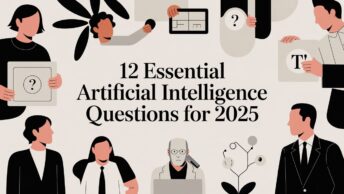How will combining quantum AI with modern computing spark a tech revolution? Today, speeding up AI isn’t just a dream—it’s driving progress. On another front, quantum computing is emerging. It promises to solve tough problems much faster than our current computers. This hints at a leap in technology.
Quantum machines use bits that can be in many states at once. They excel in specific challenges, such as optimisation and cryptography. Since quantum calculations are based on chances, they often need to be repeated to get reliable results.
But with this new power, worries come to light. Quantum computers might improve AI but also threaten online security and increase the tech gap. Combining quantum computing with AI might hugely boost AI’s power. This idea is stirring lots of discussions among experts.
Quantum AI aims to improve, not replace, current systems. It could start a new era of better computing that could change our world.
As these powerful technologies merge, we’re on the edge of a big tech revolution. Quantum computing is moving from theory to reality, changing technology as we know it. We should think about how these advances will affect society and our values. The growth of machine learning and quantum AI brings us to a crucial moment in computing—one that asks for our thoughtful involvement and moral guidance.
Exploring the Intersection of Quantum Mechanics and AI Acceleration
Quantum mechanics is at the heart of new developments in quantum tech. It’s paving the way for advanced AI acceleration. With quantum computing, we can process data much faster than with ordinary systems. This is because it tackles complex tasks more efficiently, offering a new level of speedy data handling and analysis. This increase in power comes from qubits. These can be in many states at once, unlike regular bits. This lets computers process different tasks at the same time. It makes searching and analysing data much better.
As AI gets better, adding quantum tech can hugely improve how we develop machine learning. Quantum methods like Grover’s and Shor’s can do things like crack codes and make decision-making better, outdoing regular methods. Also, quantum tech can send data very securely. This makes quantum cryptography key for safe future communication.
But, using quantum mechanics in AI development faces some big obstacles. Quantum systems are very sensitive to their surroundings. This means they can make more mistakes than regular computers. Also, there’s not much quantum data available yet. This makes it tough to train Quantum Machine Learning (QML) systems properly, limiting quantum AI’s capabilities.
Even with these hurdles, merging quantum computing with AI is starting a new chapter in tech progress. By understanding quantum mechanics well, companies can change how they look at data handling, problem-solving, and security. Current work and machine learning that rely on strong quantum algorithms are changing what AI can do. They promise a future where quantum-powered AI is key to making new breakthroughs.
Quantum Algorithms: Unleashing New Potential in Machine Learning
The merging of quantum algorithms with machine learning is reshaping data handling and computational abilities. It brings together quantum computing’s power and machine learning’s flexibility.This creates a quantum machine learning (QML) approach. QML deals with huge data sets at incredible speeds. This advances many sectors.
Quantum supremacy marks a new era in computing. It happens when quantum machines do tasks that classical systems can’t. It is driven by the use of qubits in quantum computing. These qubits can be in several states at once. This gives them much more power than traditional bits.
The Role of Quantum Bits in Enhanced Data Processing
Qubits have special traits, like superposition, which greatly improve data handling. Quantum algorithms such as the Variational Quantum Eigensolver (VQE) and Quantum Approximate Optimization Algorithm (QAOA) play a key role.They help optimise machine learning models. They solve complex issues like logistic issues and financial modelling fast. This is very valuable in manufacturing and finance.
Unlocking Computational Power Through Quantum Supremacy
Quantum supremacy boosts machine learning greatly. It allows computational tasks to be done with unmatched efficiency. It brings together quantum computing and AI.This combo provides algorithms that predict with great accuracy. They offer insights in crucial areas like drug discovery and climate prediction.
But, using quantum computing raises ethical and security concerns. Issues like data privacy and algorithm bias are important. We need strict rules and standards. This will make sure these technologies are used ethically in all fields.
Quantum Computing: A Complementary Force to Classical Systems
Quantum computing is a unique technology that works with classical computers. It uses qubits based on quantum mechanics. This means quantum systems can process many possibilities at once. Unlike classical systems that use binary bits, quantum computing can solve problems faster by working through multiple options simultaneously.
IBM’s studies show quantum computers excel in machine learning tasks. They perform better than classical systems in complex data classification. This is especially useful in areas like drug discovery and financial modeling, where these computers reduce complexity.
Quantum systems enhance, not replace, classical computers. Technologies developed by companies like Quantum Machines and Seeqc help combine both systems. This creates efficient computing setups where speed and precision matter. Hybrid systems blend classical and quantum computing, making them practical for today’s technology.
Classical systems still play a crucial role as quantum computing grows. Their stability supports the newer, less predictable quantum systems. The goal is to improve classical systems to work well with quantum technologies.
In sum, quantum computing can change industries by addressing problems in new ways. However, it’s their integration with classical computers that will push technology forward. By combining both, organisations can face future challenges more effectively.
AI and Quantum Computing: Drivers of Future Computing Innovations
The bringing together of AI and quantum computing is opening new doors in tech advancements. This mix is setting the stage for a new kind of computing. It combines quantum mechanics and artificial intelligence, creating technology that is both fast and precise for complex problems.
Technological Advancements Towards an AI-Driven Future
Quantum computers use unique quantum principles to run many calculations at once. This can make AI algorithms much faster. By joining quantum computers with traditional ones, we get systems that work better and can grow, boosting AI’s power for real tasks. Quantum AI could make computing not only quicker but also save energy. Still, there are hurdles like making error fixes and special tools for quantum use.
How Quantum Computing is Empowering AI to Solve Complex Problems
In healthcare, quantum AI could speed up finding new medicines by studying molecules. In finance, it can sort through data to spot trends, giving users an advantage. It’s also improving logistics and creating new materials, like superconductors, in science. We expect all these benefits to start showing in various sectors soon.

AI and quantum computing do more than just better current tech. They also introduce new chances in areas like entertainment and technology management. They’re changing how we manage supply chains, direct traffic, and handle finances. In the coming years, this blend of quantum computing and AI is set to transform industries and everyday life.
Anticipating Ethical and Control Challenges in Quantum AI
The link between artificial intelligence and quantum computing points to big changes but also highlights serious ethical and control problems. As quantum AI develops, important discussions are happening about how to oversee it well. This is because quantum AI might become smarter than humans and act in ways we can’t predict.
We are worried about how quantum computing might make our private data less secure. Quantum AI could break through our current security systems, like RSA and ECC. This puts our data at risk. Also, when AI and quantum tech merge, they could find and use weaknesses in networks and systems quicker. This might lead to smarter phishing attacks and more convincing fake videos and messages.
On top of this, quantum AI could be used to watch people very closely, affecting privacy. This poses a big problem for personal freedom and raises the alarm for the need for strong rules to prevent mistreatment.
Initial steps have been made to control these advanced AI applications with things like the EU Artificial Intelligence Act. But, we still have a lot to learn about the ethical sides of quantum states and their fairness in algorithms.
It’s clear that we need to improve how we govern AI because of these concerns. Experts stress the need for ethical guidelines that consider the unique aspects of quantum tech. Even big names in tech, like Google, say it’s important to have good ethical rules that cover both AI and quantum computing. This would make sure we use these advances wisely and for the good of everyone.
With quantum AI pushing the boundaries, our focus must be on using it for the good of society while avoiding risks. Everyone involved needs to be alert and innovative as we move forward with ethical Quantum AI and strong AI governance.
Quantum AI Disruption: Security Risks and Cryptography Concerns
Quantum AI is changing how we think about digital safety and secrecy. It points out the big security risks tied to coding systems. Security risks shine a light on why we must rethink our safety plans. This is due to the power of quantum computing.
Quantum AI is making us question how strong our current codes are. Quantum computers could soon crack the codes we use today. This makes the safety of our data a big worry. This worry pushes us to develop new codes to fight off quantum threats.
Re-evaluating Encryption in the Wake of Quantum Advancements
The value of quantum computing could hit US$50 billion by 2030. Fears are growing about cybercriminals using quantum power to break into our systems. This shows how crucial it is to make codes that even quantum computing can’t crack. Quantum Key Distribution (QKD) is a key breakthrough. It uses particle pairs for secure chats, helping keep our data safe as quantum tech grows.
Protecting Data Integrity in the Age of Quantum Computing
Companies all over are waking up to these increasing security threats. In 2022, the US made laws for government bodies to use future-proof cryptography. This move underlines the urgency for all to update their data safety plans quickly. Efforts like those by the World Economic Forum help build strong guidelines. These aim at keeping financial data safe from quantum dangers.
As Quantum AI grows, its effects on security and codes mark a big change. Sectors everywhere need to stay alert. They must embrace new coding techniques to protect against quantum-caused breaches.
Quantum Computing: Transitioning from Theoretical Models to Reality
The journey from theory to practice in quantum computing is gaining momentum. IBM Quantum Experience started with just five qubits in May 2016. By November 2022, it reached a powerful 433 qubits. They aim to hit 1,121 qubits by the end of 2023. This growth highlights both technological progress and the focus on real-world uses across various sectors.
Quantum computing is set to revolutionize industries such as finance, chemical manufacturing, and healthcare. For example, BASF has invested $30 million in quantum computing. This investment aims to enhance computational capabilities, leading to radical changes in how chemicals are made. IBM’s work with Cleveland Clinic is another example. Together, they are harnessing quantum computing to fast-track the development of new medicines, showcasing its vital role in healthcare innovations.
Quantum technology’s growth is also shaping education and training. This is crucial for building a workforce that can expand quantum computing’s horizons. Keio University in Japan is leading in this field. It provides access to advanced quantum systems and conducts cutting-edge research. The Qubit by Qubit program, a collaboration between IBM and MIT, is making quantum science accessible to aspiring scientists and engineers.
The path of quantum computing is evolving fast. It calls for ongoing investment and worldwide partnership. As the field advances and experiments test the reality of quantum supremacy, such as Google AI and NASA’s partnership, it moves closer to addressing real-world application challenges.
Quantum computing’s shift from theories to real-world applications brings industry-specific breakthroughs. It signals a new era in how we will build future technology. Moving from measuring qubits to being quantum-ready marks a significant period in tech development, aiming for a future where quantum and classic systems solve complex issues together.
Collaborative Approaches Igniting the Quantum and AI Revolution
Quantum computing and artificial intelligence (AI) are creating a future filled with exciting possibilities. These technologies are set to change many sectors through their unique computational skills. To make the most of these changes, working together is key. The world of quantum technology is seeing more partnerships aimed at bringing new advancements.
Programmes like the U.K.’s National Quantum Technologies Programme (NQTP) combine academic skill with corporate know-how and startup speed. This mix brings innovations that could improve our transport systems, like what the Australian government is exploring for trains, taxis, and buses. Also, these technologies are helping create sustainable solutions, like better wind farms, which are being implemented across the globe. By involving the community, these tech advances meet the wider goals and interests of society.
Fostering Partnerships for Ground-Breaking Innovations in Technology
The growth in quantum and AI technologies benefits greatly from the open-source movement. This approach is opening up access to these advanced technologies. For instance, the U.S. is promoting an open quantum environment through its quantum sandbox project. A similar trend is seen in AI, where integrating AI with user experience is making services more personalised. This community-focused approach leads to quantum and AI developments that are not only advanced but also tailored to users’ needs.
The blending of quantum computing with AI, through shared innovation and strong partnerships, is setting the stage for exciting future advancements. Embracing open-source and community involvement, the quantum and AI fields are ready for a new era. This era will be marked by groundbreaking technology exploration and applications.
FAQ
What is driving the convergence of AI and Quantum Computing?
The push to speed up AI and the hunt for new tech are merging AI with Quantum Computing. This blend opens doors to solve tough problems and create new innovations.
How do Quantum Mechanics principles contribute to AI acceleration?
Quantum Mechanics lays the ground for tech that boosts machine learning. Its ideas, like superposition and entanglement, help AI process more complex data faster.
What role do Quantum Bits play in enhanced data processing?
Quantum Bits, or qubits, boost our data handling ability far beyond classic bits. Their power to be in many states at once allows for complex calculations, improving machine learning.
What does Quantum Supremacy mean for Computational Power?
Quantum Supremacy marks when quantum computers do what classic ones can’t. This opens up incredible computing power, changing areas like cryptography and simulations.
In what way is Quantum Computing complementary to classical systems?
Quantum systems excel at certain tough calculations while classic computers handle daily tasks. Quantum Computing boosts, not replaces, our existing computing systems.
How are AI and Quantum Computing acting as drivers of future computing innovations?
AI and Quantum Computing are expanding tech limits, fueling progress in areas from healthcare to finance. They solve problems once thought unsolvable, leading to AI-driven breakthroughs.
What kind of ethical and control challenges arise from Quantum AI?
Quantum AI brings up issues about making sure AI matches our values and stays in our control. The unpredictability of quantum calculations calls for solid rules to face these issues.
How can Quantum AI disrupt current security practices, especially cryptography?
Quantum AI’s power can break today’s encryption, risking data safety. It challenges us to rethink security and invent new tech like Quantum Key Distribution to protect data.
What is the significance of transitioning Quantum Computing from theoretical models to reality?
Moving Quantum Computing from ideas to real use shows its true value. By applying it in the real world and making hybrid systems, it can greatly help various fields.
How are collaborative approaches contributing to the advancements in Quantum Computing and AI?
Teaming up with schools, businesses, and startups is key for breakthroughs, sharing knowledge and resources. Collaboration and open-source projects make sure Quantum Computing and AI advancements benefit everyone.
Source Links
- The Convergence of AI and Quantum Computing: A Cause for Concern? – https://medium.com/brthrs/the-convergence-of-ai-and-quantum-computing-a-cause-for-concern-20f243420382
- Quantum Machine Learning: The Intersection of Quantum Computing and AI Algorithms – https://medium.com/@pwaveino/quantum-machine-learning-the-intersection-of-quantum-computing-and-ai-algorithms-64be0b8c0dcf
- PDF – https://www.ijfmr.com/papers/2024/3/17789.pdf
- Council Post: The Future Of AI: Unleashing The Power Of Quantum Machine Learning – https://www.forbes.com/councils/forbestechcouncil/2024/06/24/the-future-of-ai-unleashing-the-power-of-quantum-machine-learning/
- Quantum Computing and AI: Unleashing New Potentials – https://www.linkedin.com/pulse/quantum-computing-ai-unleashing-new-potentials-ashwinkumar-br-fkzlc
- Machine Learning Gets a Quantum Speedup | Quanta Magazine – https://www.quantamagazine.org/ai-gets-a-quantum-computing-speedup-20220204/
- How Quantum Computing Can Solve Real-World Problems – https://www.insightpartners.com/ideas/how-quantum-computing-can-solve-real-world-problems/
- Supercharging AI with Quantum Computing: A Look into the Future | Capitol Technology University – https://www.captechu.edu/blog/supercharging-ai-quantum-computing-look-future
- Quantum Computing and AI: A Perfect Match? – https://www.informationweek.com/machine-learning-ai/quantum-computing-and-ai-a-perfect-match-
- Three Technologies Driving The Next 25 Years Of Computing – https://www.forbes.com/sites/timbajarin/2024/02/01/three-technologies-driving-the-next-25-years-of-computing/
- Artificial Intelligence Powering Synthetic Biology: The Fundamentals | S&P Global – https://www.spglobal.com/en/research-insights/special-reports/artificial-intelligence-and-quantum-computing-the-fundamentals
- Towards quantum ethics – https://www.ey.com/en_uk/insights/emerging-technologies/why-innovation-leaders-must-consider-quantum-ethics
- Ethics of Quantum Computing: an Outline – Philosophy & Technology – https://link.springer.com/article/10.1007/s13347-023-00651-6
- What is the cyber security risk from quantum computing? – https://kpmg.com/au/en/home/insights/2024/04/cyber-security-risk-from-quantum-computing.html
- Quantum is coming — and bringing new cybersecurity threats with it – https://kpmg.com/xx/en/our-insights/ai-and-technology/quantum-and-cybersecurity.html
- My Journey to the Exciting World of Quantum Computing — A Novice’s Perspective – https://andisama.medium.com/my-journey-to-the-exciting-world-of-quantum-computing-a-novices-perspective-c6d66e9e997e
- PDF – https://cronfa.swan.ac.uk/Record/cronfa65726/Download/65726__29613__ba1a4beb57a94b0e84e055ed8ad70392.pdf
- Quantum computing – https://en.wikipedia.org/wiki/Quantum_computing
- Governments can ignite innovation through near-term Quantum-powered applications – https://www.techuk.org/resource/governments-can-ignite-innovation-through-near-term-quantum-powered-applications.html
- Navigating the Quantum Landscape: From Cloud Computing to AI and Beyon – https://www.telecomreview.com/articles/reports-and-coverage/8073-navigating-the-quantum-landscape-from-cloud-computing-to-ai-and-beyond
Discover more from Scott Dylan
Subscribe to get the latest posts sent to your email.






